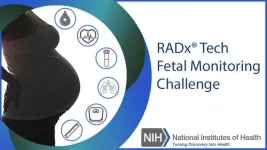(Press-News.org) COLUMBUS, Ohio – The Ohio State University will lead a new multimillion dollar international center devoted to using artificial intelligence to help understand climate impacts on biodiversity.
The AI and Biodiversity Change (ABC) Global Climate Center will bring together ecologists and computer scientists from six universities in the United States and Canada, with partners in UK, Europe, and Australia, to develop new AI-enabled, data-supported approaches to study how changes in climate are impacting life – including animals, plants and insects – on Earth.
$5 million was awarded by the National Science Foundation to researchers at Ohio State as the lead institution, as well as the University of Pittsburgh and the Massachusetts Institute of Technology.
About $3.75 million was awarded by the Natural Sciences and Engineering Research Council of Canada to researchers at McGill University, the University of Guelph and the University of British Columbia.
The team also includes core partners in the UK from University of Bristol and the University of Edinburgh; the University of Monash in Australia; EPFL in Switzerland; and WILDLABS.
The principal investigators of the center at Ohio State are Tanya Berger-Wolf, faculty director of the Translational Data Analytics Institute (TDAI), and Marta Jarzyna, assistant professor of evolution, ecology and organismal biology (EEOB) and a core faculty member of TDAI.
“Climate change is affecting every aspect of life on Earth,” said Berger-Wolf, who is also a professor of computer science and engineering, EEOB, and electrical and computer engineering.
“The problem is that we have this huge data problem: We don’t have enough data about the impacts of climate on many species, and the data we do have is messy and not aligned. And that is where AI can come to the rescue.”
Researchers in the project will conduct fundamental AI research and develop and use new AI-based methods and tools to analyze data from camera traps, sound recorders, images from satellites and low-flying aircraft, DNA sequences and citizen science efforts. They will develop new and extend existing ecological models to leverage that data and AI approaches.
“This will enable us to monitor, analyze, assess, and understand biodiversity changes around the world,” Berger-Wolf said.
One example: Researchers will develop new AI-informed ecological models to detect and understand how and why species are moving their ranges north across the border from the United States to Canada as the climate warms, potentially serving as an early warning system.
They will study 222 species of birds, mammals, amphibians and reptiles that currently breed within 800 km (about 500 miles) of the border. They will use AI analysis of satellite images and extend ecological models to determine how habitat changes might influence northward movement of species.
Acoustic sensors, camera traps and DNA barcodes – which can identify species – will help document the species’ move north.
And AI-enabled identification of photos from partner citizen science initiatives such as iNaturalist, eBird, eButterfly and Bumble Bee Watch will also show the progression of species as they approach Canada.
The findings should be able to provide early warning when various species are likely to move beyond their current ranges and into new areas in Canada not previously recorded.
“The goal is to help develop the understanding of the mechanisms of negative impacts on biodiversity due to climate change so that we may develop interventions to mitigate them,” Berger-Wolf said.
In addition to the researchers from the six universities, the project includes more than 50 partners in the United Kingdom, Australia, Africa, India, Central America and the European Union. These partners are not just in academia, but also in governments, non-governmental organizations and industry.
The partners will provide research collaboration networks, field data collections, data curation and hosting, community building, access to computational resources, tech transfer and open source tool development, and education and capacity building.
Engaging broader communities beyond academia is an integral aspect of the center, Berger-Wolf said.
“Education, outreach training and community engagement are an important part of what we will do,” she said.
Citizen science will have an important role: Members of the public will contribute to the center’s work when they submit their photos and sightings to apps like eBird and iNaturalist, Berger-Wolf said.
The ABC Global Climate Center is part of the NSF-led Global Centers program, an effort implemented with international funders “to encourage and support large-scale collaborative research on use-inspired themes in climate change and clean energy.”
Ohio State is the ideal institution to lead the ABC Global Climate Center, Berger-Wolf said, due to the concentration of researchers working on related topics who have made the university a leader in those relevant areas.
For example, in 2021 Ohio State was awarded $15 million from NSF to create the Imageomics Institute, which is developing a new field of study in which scientists use images of organisms as the basis of understanding biological processes of life on Earth.
“AI for biodiversity is a growing field of distinction for Ohio State,” she said.
“We have a wide range of expertise in AI, natural resources, ecology and climate that very few institutions can match.”
END
Ohio State leads new global climate center on AI for biodiversity change
NSF, Canadian agency to fund multimillion dollar project
2023-09-18
ELSE PRESS RELEASES FROM THIS DATE:
Ohio State researchers publish national guidelines for ALS genetic testing, counseling
2023-09-18
COLUMBUS, Ohio – Researchers at The Ohio State University Wexner Medical Center and College of Medicine led the creation of evidence-based consensus guidelines for genetic testing and counseling for patients with amyotrophic lateral sclerosis (ALS), a neurodegenerative disease that affects the cells in the brain and spine.
These evidence-based, consensus guidelines provide clinicians with a framework for the offer of genetic testing and outline the information that should be provided to persons with ALS before and after testing. In addition, the guidelines provide specific recommendations regarding ...
Study: Admissions policies that consider grades and test scores in context of available opportunities are linked to college success
2023-09-18
Indicators of high school grades and standardized test scores that take into account the levels of school, neighborhood, and family resources available to students are strongly associated with those students’ success in college, according to new research published today. The study, published in AERA Open, a peer-reviewed journal of the American Educational Research Association, emerges against the backdrop of the recent Supreme Court decision to ban race-conscious admissions in higher ...
Unlocking urban diversity: The magnetism of complex amenities
2023-09-18
Diversity fuels prosperity in cities, but where do people from diverse backgrounds meet? A study from the Complexity Science Hub now indicates that locations offering a range of rare shops and services may hold the key.
Extensive research consistently underscores a common factor in successful cities: diversity. Encouraging interactions between individuals of different backgrounds fosters the exchange of ideas, leading to innovation and economic success. “However, segregation persists in urban ...
Latest blood cancer treatment updates presented at annual NCCN event during Blood Cancer Awareness Month
2023-09-18
SAN FRANCISCO, CA [September 18, 2023] — The National Comprehensive Cancer Network® (NCCN®) 2023 Annual Congress: Hematologic Malignancies™ returns to San Francisco this week, for the first time since 2019. The meeting features insights from world-renowned experts on providing optimal, evidence-based treatment for various blood cancers, plus best practices for protecting vulnerable populations in a changing healthcare landscape.
The live event is taking place September 22-23, 2023, at the Hilton San Francisco Union Square. ...
How do suicide risk or depression screenings compare to identify patients at risk?
2023-09-18
Editor’s Note: September is National Suicide Prevention Month.
COLUMBUS, Ohio – Research led by The Ohio State University Wexner Medical Center and Wesleyan University found that depression screening tools outperformed suicide risk screenings under most conditions.
“We compared the effectiveness of multiple depression and suicide risk screening methods for the purpose of identifying primary care patients who subsequently attempted suicide. Our findings may generate a lot of discussion within the suicide prevention community, as it contradicts long-held assumptions ...
Atomic layer deposition route to scalable, electronic-grade van der Waals Te thin films
2023-09-18
A research team, led by Professor Joonki Suh in the Department of Materials Science and Engineering and the Graduate School of Semiconductor Materials and Devices Engineering at UNIST, has made a significant breakthrough in thin film deposition technology. By employing an innovative atomic layer deposition (ALD) process, Professor Seo successfully achieved regular arrangement of tellurium (Te) atoms at low temperatures as low as 50 degrees Celsius.
The ALD method is a cutting-edge thin film process that enables precise stacking ...
NIH launches $2 million prize competition to spur innovation in fetal diagnostic and monitoring technologies
2023-09-18
The National Institutes of Health will award up to $2 million in cash prizes to accelerate development of diagnostic and monitoring technologies that improve fetal health outcomes in low-resource settings. The Rapid Acceleration of Diagnostics Technology (RADx® Tech) Fetal Monitoring Challenge calls on scientists, engineers, and clinicians around the country to submit their innovative approaches and compete for prizes and additional resources to support technology development and clinical impact. The challenge is sponsored by the NIH’s National Institute of Biomedical Imaging and Bioengineering (NIBIB), ...
Incubator or barrier? Exploring the links between agriculture, biodiversity and the spread of pathogens
2023-09-18
Many pathogens, including the virus that causes COVID-19, are thought to have originated in wild animals before spilling into human populations.
Agriculture is often blamed for accelerating this process, which is known as zoonotic spillover, through deforestation and habitat fragmentation that reduce biodiversity and increase the likelihood of contact between infected wildlife and humans.
But in a Perspectives article published online Sept. 15 in the journal One Earth, University of Michigan ecologist Ivette Perfecto and her colleagues argue that agriculture can both help and hinder: ...
FAU receives $750,000 philanthropic grant for Alzheimer’s disease
2023-09-18
More than 720,000 Floridians will be living with Alzheimer’s disease by 2025. Currently, Florida has the second highest prevalence of Alzheimer’s disease in the United States and is the sixth leading cause of death in Floridians 65 and older.
Although the epidemic of age-related brain dysfunction – of which Alzheimer’s disease is a major factor – is growing at an alarming rate, there is a disconnect between the existing care model designed for urgent care and the progressive nature of this chronic condition, which tends to worsen over time.
To address this widespread health concern, Florida Atlantic University’s Schmidt College ...
Study shows nearly 300% increase in ADHD medication errors
2023-09-18
(COLUMBUS, Ohio) – Attention-deficit/hyperactivity disorder (ADHD) is among the most common pediatric neurodevelopmental disorders. In 2019, nearly 10% of United States (U.S.) children had a diagnosis of ADHD. Approximately 3.3 million children, or roughly 5 out of every 100 children in the U.S., are currently prescribed medication for ADHD.
In a new study, published today in Pediatrics, researchers at the Center for Injury Research and Policy and Central Ohio Poison Center at Nationwide Children’s Hospital investigated the characteristics ...
LAST 30 PRESS RELEASES:
Fossil amber reveals the secret lives of Cretaceous ants
Predicting extreme rainfall through novel spatial modeling
The Lancet: First-ever in-utero stem cell therapy for fetal spina bifida repair is safe, study finds
Nanoplastics can interact with Salmonella to affect food safety, study shows
Eric Moore, M.D., elected to Mayo Clinic Board of Trustees
NYU named “research powerhouse” in new analysis
New polymer materials may offer breakthrough solution for hard-to-remove PFAS in water
Biochar can either curb or boost greenhouse gas emissions depending on soil conditions, new study finds
Nanobiochar emerges as a next generation solution for cleaner water, healthier soils, and resilient ecosystems
Study finds more parents saying ‘No’ to vitamin K, putting babies’ brains at risk
Scientists develop new gut health measure that tracks disease
Rice gene discovery could cut fertiliser use while protecting yields
Jumping ‘DNA parasites’ linked to early stages of tumour formation
Ultra-sensitive CAR T cells provide potential strategy to treat solid tumors
Early Neanderthal-Human interbreeding was strongly sex biased
North American bird declines are widespread and accelerating in agricultural hotspots
Researchers recommend strategies for improved genetic privacy legislation
How birds achieve sweet success
More sensitive cell therapy may be a HIT against solid cancers
Scientists map how aging reshapes cells across the entire mammalian body
Hotspots of accelerated bird decline linked to agricultural activity
How ancient attraction shaped the human genome
NJIT faculty named Senior Members of the National Academy of Inventors
App aids substance use recovery in vulnerable populations
College students nationwide received lifesaving education on sudden cardiac death
Oak Ridge National Laboratory launches the Next-Generation Data Centers Institute
Improved short-term sea level change predictions with better AI training
UAlbany researchers develop new laser technique to test mRNA-based therapeutics
New water-treatment system removes nitrogen, phosphorus from farm tile drainage
Major Canadian study finds strong link between cannabis, anxiety and depression
[Press-News.org] Ohio State leads new global climate center on AI for biodiversity changeNSF, Canadian agency to fund multimillion dollar project



